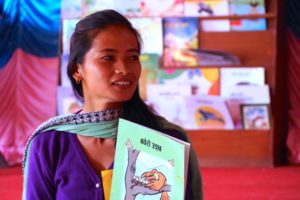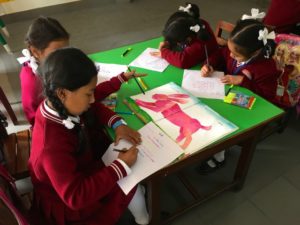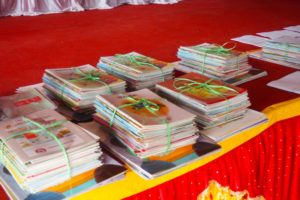We believe in the power of teacher training to improve the quality of education in Nepal.
Better teachers make better schools—and better schools, of course, make better students. Especially in the rural areas where we work, strong schools can provide critical support for the local community and improve lives for women, children and ethnic minorities.
In the months immediately following the 2015 earthquake, however, teacher training work was put on hold to give full priority to school reconstruction.
We never lost sight of our mission to help enhance the quality of children’s classroom experience. In late 2015, we were granted funds by Global Giving to provide training and materials to promote the use of Nepali-language children’s literature in government schools affected by the quake.
Working with six government schools and two private schools in rural Kavre District, we have partnered with the Nepal-based Rato Bangala Foundation to lead a four-day on-site workshop with school leaders, teachers and parents. Using children’s books the schools had been provided as part of earthquake relief, our team introduced educators to the power of literature as a tool to teach reading and writing, and as a vital component of overall academic success.

The Kavre Literacy Project involves several stages. Following the on-site training, teachers were bussed to Kathmandu in February to attend the third annual Bal Sahitya Mahotsav (Children’s Literature Festival), hosted by the Rato Bangala School. Following this, with assistance from one of our Nepali-speaking trainers acting as a mentor, teachers from each participating school led peer-based workshops for their colleagues back at their school.
During April, materials for 30 classroom book corners will be delivered to each of the six government schools, including a book rack, carpet, reading table and cushions for sitting. To encourage schools to fundraise locally for more books in the future, we held a workshop in March, focused on budgeting for ongoing book purchases. As an incentive, we offered each government school the equivalent of about $50 in matching funds.
In October, the schools will work together to host local literature festivals of their own, with the goal of spreading the word in their communities about the power of children’s books. Finally, another four-day on-site workshop will be held in November, offering the opportunity for teachers, principals and parents to give their feedback, solve problems together and share new ideas to build on the work that the schools have begun.

We conducted a survey in all six participating government schools to assess students’ familiarity with children’s books (other than the textbooks that are the standard in every Nepali classroom). At the end of the project, we’ll conduct a final survey that we hope will show increased use and awareness of Nepali-language children’s literature.
Santi School hopes to build on what we’ve learned through this work to expand our teacher education program. Additional funds will allow us to deepen our relationships with the teachers, parents, school leaders and communities we’ve come to know through our post-earthquake literacy project and to build new relationships through intensive, high-quality teacher training.


Recent Comments